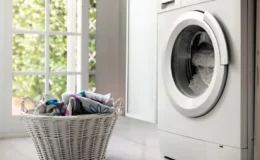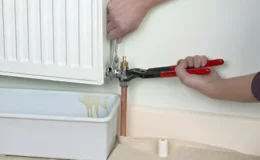
- Content Guide
- - What Causes My Smoke Alarm to Chirp?
- - What Do Chirping Smoke Alarms Indicate?
- - How You Can Ensure Your Smoke Alarms Remain Operational At All Times?
- - What If My Smoke Alarm Is Beeping continuously?
- - My Smoke Alarm Chirping Intermittently
- - Why Does My Hard-Wired Smoke Alarm Chirp?
- - Do I Need To Replace The Mains-Powered Smoke Alarm?
- - How Long Does A Smoke Alarm Chirp Before It Stops Working?
- - Why Do Smoke Detectors Make A Chirping Sound?
- - Can A Smoke Alarm Beep Even If There's No Battery?
- - Professional Co And Smoke Alarm Installer
The sound of a smoke alarm can be life-saving. It instantly triggers our sense of danger and prompts a swift response. The persistent peep of a chirping smoke alarm has become synonymous with home safety, and more often than not, it signals that the alarm is not functioning properly.
In this detailed blog, we will decode the message behind why these vital devices chirp, the consequences of ignoring the sound, and how to make sure your house is still a safe place for your family and tenants to live.
The Chirp That Cannot Be Ignored!
It's important to recognise the smoke alarm chirping, and its fundamental role in keeping our homes safe. These alarms are essential for being prepared in emergencies, as they constantly monitor for any signs of fire, day or night.
Data from top fire safety authorities consistently emphasises their significance. According to the research, many fire fatalities are caused by fires in homes without functional smoke alarms. However, merely installing a smoke alarm is not enough—understanding its signals is crucial.
When a smoke alarm detects potentially combustible products in the air, it triggers a loud, continuous alarm to alert occupants of potential danger. This alarm persists until the air clears, ensuring everyone is aware of the potential hazard. If the alarm is continuously sounding, it's crucial to follow the appropriate procedures outlined in your smoke alarm manual or manufacturer's guidelines.
Sometimes, the alarm may be falsely triggered for various reasons. But how? One common cause is a dirty sensing chamber, which can interfere with the alarm's ability to detect smoke or other particles accurately.
What Causes My Smoke Alarm to Chirp?
Smoke alarms may beep or chirp intermittently due to various reasons.
 Improperly Installed Battery
Improperly Installed Battery
One common cause is a loose or improperly installed battery. Make sure the battery is securely installed and has a use-by date within four to five years. Ensure it's snapped in completely, and check for good battery connections.
Environmental Conditions
Environmental conditions like humidity, steam, or temperature fluctuations can also trigger random chirping. Avoid placing alarms near cooling/heating sources or open windows. If needed, consider relocating the alarm. Extreme changes in temperature and high humidity can lead to condensation.
Sometimes, a manual reset is required. After removing the battery and turning off the alarm, hold down the test button for 15 seconds. Reconnect the power and reinstall the battery.
Electrical ProblemsElectrical issues such as power surges or interruptions can also cause chirping. Check if other household devices affect the alarm and ensure it's on a dedicated circuit. If chirping persists despite troubleshooting, it may be time to replace the alarm, as age can be a factor.
When your smoke alarm starts chirping, it is not trying to tell you it needs your attention — it's demanding it.
What Do Chirping Smoke Alarms Indicate?
Typically, smoke alarms chirping indicate 3 primary reasons:
Running on Empty: Low Battery Warning
The most common cause of a chirping smoke alarm is a low or dead battery. These devices are engineered to chirp when the battery power falls below a certain level. This feature is designed to prevent a smoke alarm from suddenly and unexpectedly going silent when the power diminishes.
End-of-Life AnnouncementLike most electronic devices, smoke alarms have a finite lifespan. When they reach the end of their life, which is usually around 10 years, they emit a certain number of chirps at regular intervals, indicating that it's time to replace them with newer, safer models.
Maintenance RequiredSome alarms are just plain needy. If you hear chirping from a seemingly brand-new device, it probably needs a bit of TLC.
In the mean time, your alarms must receive routine cleaning and maintenance in order to continue working properly. Since the accumulation of dust and debris over time could reduce the sensor's capacity to detect smoke and lead to chirping.
Before assuming that the alarm activation is a false alarm, it's crucial to verify that there is no actual emergency situation. Make safety a top priority and adhere to established protocols to safeguard the well-being of everyone nearby.

Some homeowners, perhaps used to the background noise of city life, mistakenly ignore the chirping, labelling it a mere inconvenience. Yet the chirp of a smoke alarm is much more than an annoyance; it's a critical warning that your safety net is compromised.
A Chirping Smoke Alarm is Not a Suggestion
A chirping smoke alarm leaves no room for procrastination — it insists on urgent action and prompts us to perform regular checks.
How You Can Ensure Your Smoke Alarms Remain Operational At All Times?
 Maintain a Schedule
Maintain a Schedule
Just like any other appliance, smoke alarms require a schedule of maintenance. Set a recurring reminder every six months to test each alarm and replace the batteries. Daylight saving time changes are a great cue for this routine.
Quality AssuranceEnsure your alarms meet the standard safety regulations for your area. There's a range of technologies and types, from basic ionisation and photoelectric to more advanced models that offer wireless interconnectivity and integration with smart home systems.
Watch for the Warning SignsFamiliarise yourself with the different sounds your alarm might make and what each sound means. For example, you could hear a short beep to indicate a malfunction, a continuous siren to signal a fire, or the asynchronous chirping of a low battery or need for replacement.
What If My Smoke Alarm Is Beeping continuously?

If your smoke alarm keeps beeping, first, you should check your property inside out to make sure there is no smoke or fire in your property.
Make sure it's not from your smoke alarm.Another important duty is to confirm the beeping is coming from your smoke alarm and not from other alarms, such as carbon monoxide (CO) detectors or burglar alarms.
Clean the alarmIf the alarm appears dusty or dirty, vacuum around it or blow out dust with a hairdryer in a cool setting.
Check the alarm's age.Inspect the replace-by date on the back of your smoke alarm. Smoke alarms typically last up to 10 years, so if the manufacturing date is approaching or exceeds this limit, it's time to replace the alarm, as the sensors may become less effective over time.
Check the location of your alarm.Review the position of your alarm, as different types are suitable for specific locations in your home. Ensure proper positioning for optimal performance.
Book a Serviceteam Smoke Alarm Installer Today!
My Smoke Alarm Chirping Intermittently
Your smoke alarm chirping intermittently may indicate several potential issues that require attention.

- Firstly, the most common reason for this chirping is a low battery.
- Additionally, it's essential to check the manufacturing date on your smoke alarm.
To address this, replace the battery in your smoke alarm with a fresh one. Ensure you use the correct battery type and insert it correctly to ensure proper functionality. It's important to note that if the battery is low, it may be more likely to sound at night due to a drop in room temperature affecting the battery's power output.
Smoke alarms typically have a lifespan of up to 10 years. If the manufacturing date is approaching or exceeds this timeframe, it's time to replace the smoke alarm entirely. Over time, the sensors inside the alarm can deteriorate, rendering the alarm less effective in detecting smoke or fire hazards.
- Another potential cause of intermittent chirping could be damage or faults in the smoke alarm itself.
Exposure to water, fire, grease, or certain types of paint can lead to damage or malfunctions. If you suspect any damage or fault in your smoke alarm, it's crucial that you replace your smoke alarm as soon as possible to ensure the continued safety of your home and family.
In summary, addressing issues such as low battery, outdated manufacturing date, or damage to the smoke alarm is crucial to maintaining its effectiveness in detecting potential fire hazards. Regular maintenance and prompt replacement of faulty alarms are important for the safety and security of your household.

Why Does My Hard-Wired Smoke Alarm Chirp?
Sometimes, even with false alarms, hard-wired systems can develop processor error codes, causing the chirping noise. To reset the device, look for a reset button on the device or power it down by cutting power from the circuit.
Do I Need To Replace The Mains-Powered Smoke Alarm?
Yes, mains-powered smoke alarms need replacing after 10 years because the sensors inside them start to wear out over time.
If you have battery-powered smoke alarms, you can easily replace them by changing the batteries. But for mains-powered alarms, you can buy the same model of alarm and replace it with a new unit. If you need to replace your existing smoke alarm, call serviceteam for a professional installation service.
How Long Does A Smoke Alarm Chirp Before It Stops Working?
If you have a battery-powered smoke alarm, it will chirp for about a month before the battery dies. But if it's a hard-wired alarm with both AC power and a backup battery, it will keep chirping until you replace the backup battery.
Why Do Smoke Detectors Make A Chirping Sound?
Smoke detectors chirp to indicate a low battery. This chirping happens every 30 to 60 seconds for at least seven days. When you hear this, it means the battery needs replacing. You can stop the chirping by disconnecting the unit and installing new batteries.
Some newer models also have a "low battery hush" feature, which silences the chirping for up to 12 hours when you press the test/hush button.
Can A Smoke Alarm Beep Even If There's No Battery?
If your smoke detector is hard-wired, it may still beep even without a battery. This could be because the backup battery has been activated, signalling a problem. If the backup battery has run out, it can cause the hard-wired smoke detector to chirp.
Educational Outreach: Know The Sound Of Safety
Educating everyone in your home about smoke alarms is as vital as installing them. Develop a family fire escape plan that includes the alarm's sound, what to do when you hear it, and the designated meeting point outside the home. Make it a part of regular drills.

Professional CO And Smoke Alarm Installer

If you understand the significance of smoke alarms but haven't installed one on your property yet, contact serviceteam today to schedule your smoke or CO alarm installation.
Serviceteam is committed to your safety and offers reliable smoke alarm installation and smoke alarm repair services to keep your home secure. Whether it's replacing the batteries in your alarms or installing new, cutting-edge devices, our team of experts can ensure that your home remains a sanctuary.
Contact us today for a comprehensive inspection of your fire safety devices, and rest assured, the sound of your smoke alarm will always be music to your ears and reassurance of your family's safety.






